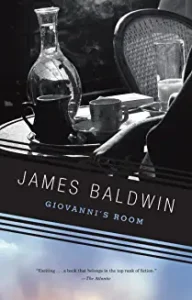Giovanni’s Room by James Baldwin 1956
With the rise of Black Lives Matter, James Baldwin (1924-1987) has been much in the news with reissued novels and a new collection of non-fiction, an Oscar-nominated movie about his life, and the resurfacing on You Tube of his 1965 debate at Cambridge with William F. Buckley. Harold Bloom referred to Baldwin as “among the most considerable moral forces of the 20th C.”
I had read ‘The Fire Next Time’ as an 18 year old headed to Harvard when it was named one of the three required reading books before freshman year. I re-read it a couple of years ago, struck by its tragic symmetry with the commentaries on the plight of Black Americans of W.E.Dubois 50 years earlier and Ta-Nehesi Coates 50 years later, but this is the first of his novels that I’ve read.
“Giovanni’s Room’ was his second novel, published while he lived in Paris, and dealing with complex themes of isolation, relationships, homosexuality, and violence, both physical and emotional. The book is a first-person narrative by David, a blond, white man in his late 20’s who is living in Paris, supported by his father. His fiance, Hela, goes to Spain to experience life, and David reluctantly but eventuallybecomes the passionate lover of a bartender named Giovanni, an immigrant from Italy, poor and uneducated. The love affair takes place in the eponymous room where the two men live intimately for weeks until Hela returns when David abruptly abandons Giovanni. The latter goes on to murder the gay older man who had employed him, and the novel concludes as David returns to America alone, his engagement ended and Giovanni about to be guillotined.
The novel begins slowly and I almost dropped it, but the pace quickens and the writing is powerful as Giovanni, David, and Hela along with a few supporting characters from the gay Paris life try to figure out who and what they are. Now considered a classic of LGBQ literature and Baldwin now seen as the emerging influence on a generation of African-American writers including Toni Morrison and Maya Angelou, this volume is an excellent introduction to his fiction.



